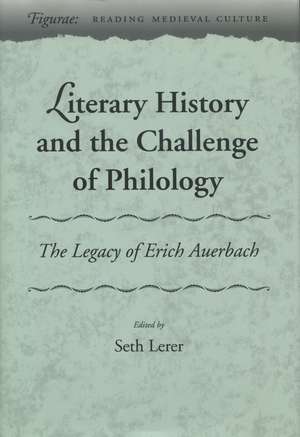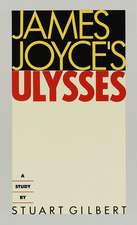Literary History and the Challenge of Philology: The Legacy of Erich Auerbach: Figurae: Reading Medieval Culture
Editat de Seth Lereren Limba Engleză Hardback – 30 apr 1996
A century after his birth and fifty years after the composition of Mimesis, Auerbach still stands as a touchstone for contemporary academic debates on the place of historical criticism in the construction of literary history, on the relations between intellectual activity and political action, and on the function of the critic in recording—or effecting—social change. More than an occasion to review past accomplishments or revel in the nostalgias of prewar Marburg or postwar New Haven, the papers offered in this volume seek to reassess Auerbach's work and his example for the modern academic. Their genesis lay in a conference at Stanford University held in October 1992, and while they do not represent a consensus of opinion or a uniformity of school or approach, they all share the recognition of the timeliness of such a reassessment.
Din seria Figurae: Reading Medieval Culture
-
 Preț: 194.70 lei
Preț: 194.70 lei -
 Preț: 331.63 lei
Preț: 331.63 lei -
 Preț: 273.03 lei
Preț: 273.03 lei -
 Preț: 274.79 lei
Preț: 274.79 lei -
 Preț: 196.89 lei
Preț: 196.89 lei -
 Preț: 272.16 lei
Preț: 272.16 lei -
 Preț: 288.30 lei
Preț: 288.30 lei -
 Preț: 512.49 lei
Preț: 512.49 lei - 19%
 Preț: 451.31 lei
Preț: 451.31 lei -
 Preț: 483.04 lei
Preț: 483.04 lei - 19%
 Preț: 445.39 lei
Preț: 445.39 lei - 19%
 Preț: 535.54 lei
Preț: 535.54 lei - 19%
 Preț: 479.21 lei
Preț: 479.21 lei - 19%
 Preț: 508.71 lei
Preț: 508.71 lei -
 Preț: 519.02 lei
Preț: 519.02 lei - 19%
 Preț: 510.12 lei
Preț: 510.12 lei - 19%
 Preț: 537.57 lei
Preț: 537.57 lei - 19%
 Preț: 535.36 lei
Preț: 535.36 lei - 19%
 Preț: 511.35 lei
Preț: 511.35 lei - 19%
 Preț: 508.88 lei
Preț: 508.88 lei
Preț: 451.93 lei
Preț vechi: 557.94 lei
-19% Nou
Puncte Express: 678
Preț estimativ în valută:
86.47€ • 90.53$ • 71.55£
86.47€ • 90.53$ • 71.55£
Carte tipărită la comandă
Livrare economică 05-19 aprilie
Preluare comenzi: 021 569.72.76
Specificații
ISBN-13: 9780804725453
ISBN-10: 0804725454
Pagini: 316
Dimensiuni: 152 x 229 x 15 mm
Greutate: 0.64 kg
Ediția:1
Editura: Stanford University Press
Colecția Stanford University Press
Seria Figurae: Reading Medieval Culture
ISBN-10: 0804725454
Pagini: 316
Dimensiuni: 152 x 229 x 15 mm
Greutate: 0.64 kg
Ediția:1
Editura: Stanford University Press
Colecția Stanford University Press
Seria Figurae: Reading Medieval Culture
Recenzii
"The lasting impact of this volume will be found less in historicizing Auerbach as a literary figure than in revitalizing his enterprise for literary studies—and for medieval studies in particular. . . . What he provides us is a methodology that belies the common criticism of medieval philology that its efforts are irrelevant to contemporary literary practice."—Envoi
Textul de pe ultima copertă
“The lasting impact of this volume will be found less in historicizing Auerbach as a literary figure than in revitalizing his enterprise for literary studies—and for medieval studies in particular. . . . What he provides us is a methodology that belies the common criticism of medieval philology that its efforts are irrelevant to contemporary literary practice.”—Envoi
Descriere
These fourteen essays draw on new biographical information and recent developments in literary theory and cultural studies to reinterpret Auerbach's work, both in the social and historical contexts of its author's life.















